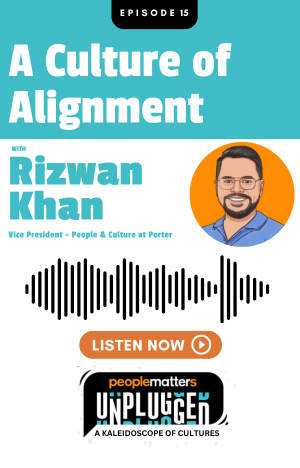AI imperatives for modern talent acquisition

The world of recruitment is at a crucial phase as we're delving into the intersection of AI and HR, and it is fundamentally changing the future of recruitment.
Recently, I had the opportunity to speak with talent leaders in Mumbai to understand how they're thinking about the revolving recruitment landscape. To delve deeper into this emerging paradigm, AMS India recently hosted a conversation with Bill Pelster, Co-founder of The Josh Bersin Company, with talent leaders in Mumbai on 5th April at Taj Santacruz.
Bill and I shared insights on the evolving talent and technology landscape, particularly focusing on the impact of AI. Before delving into the specifics of talent acquisition and technology, I believe it's crucial to provide context on the broader global trends.
What's changing
Firstly, there's a worldwide labour shortage, a phenomenon that might not be as acutely felt in India as in other regions, but it's definitely on the horizon. Demographic shifts are playing a significant role in exacerbating this scarcity, and understanding these dynamics is crucial for TA professionals navigating the challenging recruiting landscape.
Secondly, organisations across the board are undergoing transformation. The PwC CEO survey highlights that a majority of CEOs anticipate their businesses to be markedly different in the next five years. This means that every company is straddling two worlds—the present operational reality and the vision for the future. This dual challenge of maintaining current operations while pivoting towards a new paradigm is like steering a fighter plane rather than a slow-turning ship, demanding agility and adaptability at an unprecedented pace.
The advent of AI has added another layer of complexity to this landscape, disrupting traditional workflows and prompting organisations to rethink their strategies and structures. While the upheaval caused by AI might be unsettling, there's also room for optimism and exploration of its transformative potential.
Lastly, in the face of a global labour shortage, employee expectations are soaring. People are increasingly in the driver's seat, demanding more from their employers. For instance, in the US, the voluntary quit rate remains high, underscoring the importance of offering compelling incentives and environments to attract and retain top talent.
The shift in recruitment
The landscape we find ourselves in is characterised by profound shifts and challenges.
Consider the juxtaposition: while headlines scream of layoffs and corporate restructuring, beneath the surface, a quiet revolution is underway, with companies like Procter and Gamble quietly absorbing thousands of skilled workers. The unemployment rate remains relatively stable, disguising the seismic changes that are reshaping the employment landscape.
In talent acquisition, the journey ahead promises to be tougher than ever. Recruiters face a paradigm shift, moving beyond traditional notions of filling vacancies to addressing broader business challenges. The days of simply sourcing candidates are long gone; today's TA professionals must navigate complexities ranging from upskilling and reskilling to mobility and contracting.
But why are we facing such formidable obstacles?
At the heart of it lies a structural shift reshaping the global workforce. Demographic trends, such as declining birth rates, paint a sobering picture of a world where there simply aren't enough people to fill available roles. This demographic drought isn't limited to a single region; it's a global phenomenon with far-reaching implications.
Compounding this challenge is the changing nature of careers. No longer tethered to a single company, employees are increasingly empowered to seek out opportunities that align with their aspirations and values. This has profound implications for talent retention and development, necessitating a shift towards systemic HR strategies that prioritise upskilling, mobility, and employee experience.
Industries themselves are undergoing fundamental transformations. The days of defining careers by job titles and industry verticals are fading, replaced by a skills-driven paradigm. This horizontal approach to talent recognises the fluidity of skills across industries and underscores the importance of agility and adaptability in today's workforce.
In navigating these complexities, it's essential to adopt a holistic perspective, one that transcends traditional silos and embraces the interconnectedness of talent, business strategy, and industry dynamics. Only by understanding and embracing these shifts can organisations hope to thrive in an increasingly volatile and uncertain world.
Changing recruiter's role
Gone are the days of simply competing within your industry vertical. Now, every recruiter, from media tech to banking, is eyeing your talent pool through the lens of skills. This seismic shift means that your competition is no longer confined to your industry; it's every recruiter out there.
Consider the case of two industry giants, Disney and Netflix. While they may operate in different spheres, they're both grappling with the need to adapt and innovate. Disney is venturing into the tech realm with its streaming services, while Netflix aims to create original content akin to traditional media companies. This dual identity crisis underscores the broader trend: every industry is in a state of reinvention.
And let's not forget the role of AI in reshaping the workforce. What was once considered cutting-edge, like coding camps for kids, is now being disrupted by AI's ability to automate tasks. The focus is shifting towards problem-solving and strategic thinking, areas where human expertise still reigns supreme.
The rise of AI
The rate of change is fast-moving today, leaving HR and talent acquisition pros scrambling to keep up. We're in the midst of a paradigm shift where critical thinking, adaptability, and reinvention take centre stage. Take the example of legacy skills versus emerging needs. It's not about discarding the old guard; it's about evolving and acquiring new competencies to stay relevant.
Let's zoom out and look at the bigger picture—the transition from the industrial model to the post-industrial era. In the past, it was all about surplus talent and job-centric structures. But today, the tide has turned. Talent is scarce, and the focus has shifted to skills. Enter technology, with its promise to reshape the workforce and enhance human capabilities.
This brings us to a crucial concept: working at the top of your license. It's about harnessing technology to automate mundane tasks, allowing humans to focus on high-value activities. And let's not forget the transformative potential of AI. Just as Excel revolutionised our approach to data analysis, AI holds the promise of unlocking new possibilities in how we work.










